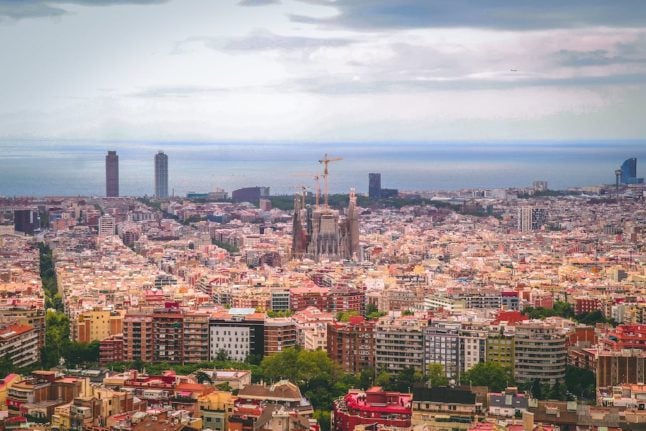Spain’s new housing law, which was introduced last year, included a clause that would allow local housing administrations to declare areas known as ‘stressed rental zones’ and implement action plans to remedy the imbalances in the rental market.
Stressed areas as those that meet one of two pieces of criteria. Areas that exceed the Consumer Price Index (CPI) of their respective province by five points and where families dedicate more than 30 percent of their salary to paying the rent.
In these areas, landlords will be forced to charge rents within a certain range and will also be incentivised to do so through certain ‘bonuses’ which can be offset against tax.
Catalonia will be the first region in Spain to declare a ‘stressed zone’ under the new regulations, where rents are some of the highest in the country, particularly in and around Barcelona.
READ ALSO – MAP: The high-demand areas in Spain where rents will be controlled
New measures to be in force from February 2024
The Minister of Territory of the Generalitat of Catalonia, Ester Capella, announced recently that starting in February rental prices will be further regulated in the region.
“In February, the containment of rental prices will come into force in Catalonia,” she stated.
In 2022, the Spanish government set a general two percent ceiling on rent increases across the country which was extended again in 2023. In 2024, this has been increased slightly to three percent.
The introduction of these ‘stressed zones’ allows for even greater control above and beyond these caps, including rent freezes.
Following the agreement reached between the Catalan government and Spain’s Ministry of Housing and Urban Agenda (MIVAU), rent freezes for between one and three years will be introduced in 140 municipalities in the region.
READ ALSO: What Spain’s new housing law means for you if you’re a landlord
Rent caps set a ceiling on the amounts landlords can increase rental contracts by, while rent freezes stop them from increasing prices completely during a certain amount of time. Rental regulations on the other hand introduce certain parameters that landlords must stick to. For example, from 2025, regulations mean that rental prices will be tied to a newly created index, instead of just having caps.
The Catalan government had been waiting months to implement the new rules but was held up by the fact that the central government still had to publish its reference index for these so-called ‘stressed zones’.
Which areas have been declared ‘stressed zones’ and how will it work?
These zones include Catalonia’s major cities such as Barcelona, Tarragona, Lleida and Girona, as well as the main towns in the Barcelona Metropolitan Area, such as Hospitalet de Llobregat, Terrassa, Badalona, Sabadell, Mataró and Santa Coloma de Gramenet, along with Reus near Tarragona.
The law has already passed through the Catalan parliament, so once it’s implemented in February, rental prices in force in the 140 municipalities will be frozen between one and three years, and new contracts may not exceed the index that is finally approved.
“For us, for the Government of Catalonia, for the Department of Territory, it is very good news, as it is also for the citizens of Catalonia, that income containment is a reality in February,” Capella celebrated.
Not everyone believes this will have positive effects
Although in theory, freezing rents and introducing further controls sounds like a good idea, particularly for tenants, many experts believe that in practice it will lead to further problems.
Francisco Iñareta, the spokesperson for property portal Idealista, explained: “It is not good news, especially for those families who need to rent a home starting next month. Catalonia is precisely the place where these recipes have already been tested and where the results have been contrary to those desired: a significant drop in available supply and price increases, despite being controlled. There is no place where price control has been beneficial for citizens and in all the cities where it has been implemented the consequences have been the same – shortage of housing, enormous difficulties in access, very selective criteria on the part of the owners and the birth of the black market”.
His opinions were also echoed by David Caraballo, general director of Rental Insurance. “This announcement makes us glimpse dramatic consequences for the model of access to housing. We have already witnessed the inefficiency of using indices to limit price historically. We have seen it in Great Britain, in Berlin, in Paris and very recently in Catalonia.”
He also insisted like Iñareta that will produce adverse effects. “Not only has it not been possible to regulate the rental market, but it has been confirmed how it has affected supply, shrinking, and even demand, intensifying it. And prices skyrocketing as a consequence of the gap between the reality of the market and the intervened income,” he explained.
Looking back to 2022
Catalonia already regulated rental prices through a law that was in force until March 2022, but it was overturned by the Constitutional Court and now no longer applies. The approval of the Housing Law means that now the region can introduce further controls to aim to rectify its skyrocketing prices.



 Please whitelist us to continue reading.
Please whitelist us to continue reading.
Member comments